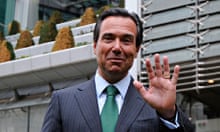Europe’s top banking regulator has warned banks they should not hand their staff top-up payments to avoid the EU bonus cap in a move that could have implications for dozens of banks and thousands of bankers.
The tougher than expected decision by the European Banking Authority (EBA) also risks putting the UK’s already strained relationship with the EU under further pressure and has rekindled the controversy over whether the bonus cap would actually lead to increases in the salaries of bankers. George Osborne, is already challenging the EU’s bonus rules in the European court of justice.
The EBA did not name any banks as it published its analysis into the way the industry has implemented the cap on bonuses, which came into effect at the start of this year and restricts payouts to 100% of a bankers’ salary, rising to 200% if shareholders grant their approval.
But banks such as Barclays, HSBC and bailed-out Royal Bank of Scotland are expected to be hit, along with Wall Street firms with a major presence in the City, such as Goldman Sachs.The EBA found that 39 banks in six EU states started paying “allowances” or “role based” sums alongside traditional salaries and bonuses after the bonus cap was introduced this year. The banks have argued that these payouts are not standard pay and should be not be classified as bonuses because they are not linked to performance.
But the EBA contradicted this view and said that these extra payments should be regarded as “variable” components of pay, like a bonus, and that banks using them are breaching the ratio set out by the EU.
Among the bosses of UK banks receiving allowances are Stuart Gulliver, HSBC’s chief executive, who is being handed £1.7m while his counterparts at bailed-out Lloyds Banking Group, António Horta-Osório, at RBS, Ross McEwan, and at Barclays, Antony Jenkins, are receiving around £1m each.
“It is reverse engineering. Nobody can deny this,” said Isabelle Vaillant, the director of regulation at the EBA.
The EBA called on national regulators to ensure the banks they regulate were compliant with the cap by the end of the year. However, this does not mean that changes will be made immediately as the EBA’s opinion is not legally binding and further guidelines on pay are expected from the EBA later this year.
The implications for UK banks will also depend on how the Bank of England reacts. Andrew Bailey, the top regulator at the Bank’s Prudential Regulation Authority, has described allowances as the “least bad outcome” of the cap. Given these previous remarks it is believed unlikely that Bailey, who sits on the board of the EBA, would have endorsed the latest opinion from the European regulator.
In the UK, the ratio between variable and fixed pay for the highest paid bankers in the City was 370% in 2012 – illustrating the impact that restricting bonuses to 100% or 200% would have on pay deals.
Tom Gosling, head of PricewaterhouseCoopers’ reward practice, said the EBA’s verdict was at the “severe end” of expectations. “As a result of these new rules the vast majority of major banks operating in the EU will need to change their remuneration policies,” said Gosling.
Banks in the UK put their remuneration policies to a shareholder vote at this year’s annual meetings. All received the support they asked for and Robert Talbut, the chief investment officer at Royal London Asset Management, warned the report from the EBA “was not a good outcome”.
He tweeted: “EU banning of allowance in banking pay is misguided and is only likely to inflate salaries and fixed costs further.”
Andrew Tyrie, the Conservative MP who chairs the Treasury select committee, warned the cap “will encourage banks to increase fixed pay rather than embed incentive structures that improve standards”.
Osborne is challenging the original legislation in European courts and a Treasury spokesperson said: “We expect to receive the EBA’s guidelines on this issue in due course, which will then be subject to public consultation.”
Outgoing EU financial markets commissioner Michel Barnier had urged the EBA to review the allowances. He tweeted: “I welcome the EBA’s findings on bankers’ allowances. Existing rules must be implemented properly: important signal to the rest of society”.
However, Omar Ali, UK head of banking and capital markets at EY, said banks “will have already restructured their remuneration packages in accordance with the rules around fixed allowances” in anticipation of the EBA decision.
The EBA said allowances could be fixed remuneration – and therefore not be included in the ratio in calculating the bonus cap – if the payment was predetermined, permanent for the time of the individual holds the rule, and non-revocable.







Comments (…)
Sign in or create your Guardian account to join the discussion